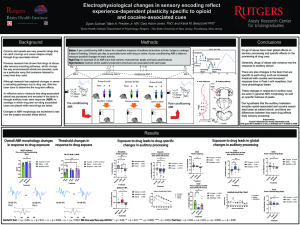Sullivan, Dylan: Electrophysiological changes in sensory encoding reflect experience-dependent plasticity to opioid and cocaine associated cues
Title: Electrophysiological changes in sensory encoding reflect experience-dependent plasticity to opioid and cocaine associated cues
Name: Dylan Sullivan
Major: Psychology
School affiliation: School of Arts and Sciences
Programs: Aresty – Research or Conference Funding Recipient
Other contributors: Kasia M. Bieszczad, Mark A. Presker Jr.
Abstract: Drug abuse is a pervasive problem for society, and it is important to understand how it changes the physiology of the body and brain. This experiment investigates plasticity in the sensory brain that is driven by exposure to drug (morphine or cocaine) and drug-associated auditory cues. The auditory brainstem was targeted because it is responsible for the initial transmission, processing, and integration of auditory stimuli before it reaches higher-level cortical processing. If there is experience-dependent plasticity in the early auditory processing of drug-associated cues, then part of the etiology of drug addiction may be related to the effects of these drugs on sensory systems. To investigate this hypothesis, subjects (male Long-Evans rats) were split into three groups that all received a tone paired with saline, and another tone paired with treatment (saline, morphine, or cocaine). Drug-dependent effects were compared within subjects to control tone (saline), and across subjects to control group (saline only group) to determine if morphine or cocaine have any lasting effects on sensory processing. Subjects were given two sessions per day for two weeks to establish an association between the tone and treatment. Auditory brainstem responses (ABR) were recorded before and after cue-association training to determine plasticity in the early auditory system. A panel of comparisons was carried out to determine if there are any significant differences in ABRs between and within groups. The findings support the idea that drugs of abuse have both global effects on sensory processing and specific effects on the processing of drug cues. Furthermore, these effects are unique to different categories of drugs. These data offer a novel insight about the effects of opioids and stimulants on long-term sensory plasticity and cued behavior that warrant further research.
